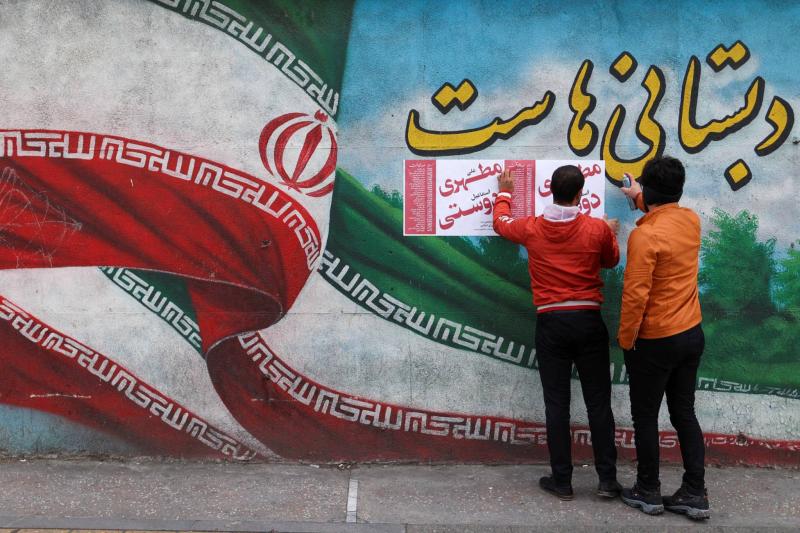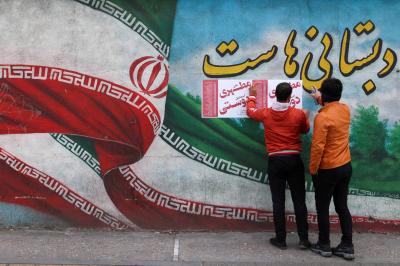Iran is preparing for parliamentary elections tomorrow, Friday, which are seen as a test of the popularity of the religious institution, amid rising opposition due to a series of political, social, and economic crises. This voting will be the first official test since the anti-government protests of 2022 and 2023 escalated into one of the fiercest political upheavals in Iran since the Islamic Revolution in 1979. Critics, both from within the ruling elite and outside it, including former politicians and parliamentarians, argue that the legitimacy of the religious system in Iran may be at stake due to economic crises and the lack of electoral options for a population largely composed of young people who feel angered by political and social restrictions.
Iran's Supreme Leader Ayatollah Ali Khamenei described voting as a religious duty. He accused the "enemies" of the country, a term he typically uses to refer to the United States and Israel, of trying to instill despair in voters. The commander of the Iranian Revolutionary Guard, Hossein Salami, stated yesterday, Wednesday, that "every vote is like a missile launched at the heart of the enemy." However, painful memories of the recent past linger for Iranians, who still recall how protests erupted across the country following the death of a young Iranian Kurdish woman while in custody of the morality police in 2022. Authorities responded to the protests with a violent crackdown that included mass arrests and even executions.
Economic difficulties pose another challenge. Many analysts say that millions have lost hope that the clerics ruling the country can resolve the economic crisis, exacerbated by U.S. sanctions alongside mismanagement and corruption. While supporters of the institution are likely to vote for conservative candidates, widespread public anger over declining living standards and rampant corruption may drive many Iranians to abstain from voting and stay home. The prices of essential goods such as bread, meat, dairy products, and rice have soared dramatically in recent months. The official inflation rate is about 40 percent, while analysts and observers estimate it exceeds 50 percent. The U.S. withdrawal in 2018 from the nuclear deal reached in 2015 between Iran and the six major world powers, along with the subsequent re-imposition of sanctions, dealt a severe blow to the Iranian economy. Efforts to revive the agreement have not yielded results.
### Reformists Avoid Voting
Iranian activists and opposition groups are widely promoting a hashtag on social media urging people not to vote, as they see high voter turnout as legitimizing the ruling system in the Islamic Republic. With the absence of prominent moderates and conservatives in the elections scheduled for tomorrow and considering that reformists deem it "an unfree and unfair election," the voting will put hardliners against lesser-known conservative politicians from the same camp, all of whom are anyway loyal to the ideals of the Islamic Revolution.
The Interior Ministry stated that 15,200 candidates will compete for the 290 parliamentary seats, after the Guardian Council approved 75 percent of the initially registered candidates. The unelected Guardian Council, composed of six clerics and six legal experts from Khamenei's close circle, has the authority to vet election laws and candidates. The counting of ballots will primarily be done manually, so the final results may not be announced for three days, although partial results might be available earlier.
Voters will also choose the Assembly of Experts, which appoints the Supreme Leader and can also dismiss them. The council, composed of 88 members, rarely intervenes directly in politics but is expected to assist in choosing Khamenei's successor, who is 84 years old. The parliament has limited influence over foreign policy or Iran's nuclear agenda, which is ultimately decided by Khamenei, who holds supreme authority in this uniquely dual governmental system that combines religious and republican rule.
Polls are expected to indicate a participation rate of around 41 percent, but former MP Mahmoud Sadeghi spoke on Monday about polls predicting a turnout of 27 percent, significantly lower than the 42 percent recorded in the 2020 parliamentary elections. After years of failed attempts to expand political and social freedoms, public acceptance of reformist opposition has further declined in 2022 when protesters mocked its call for gradual change. The Reform Front coalition stated that it would not participate in "futile" elections but did not officially boycott the vote.




